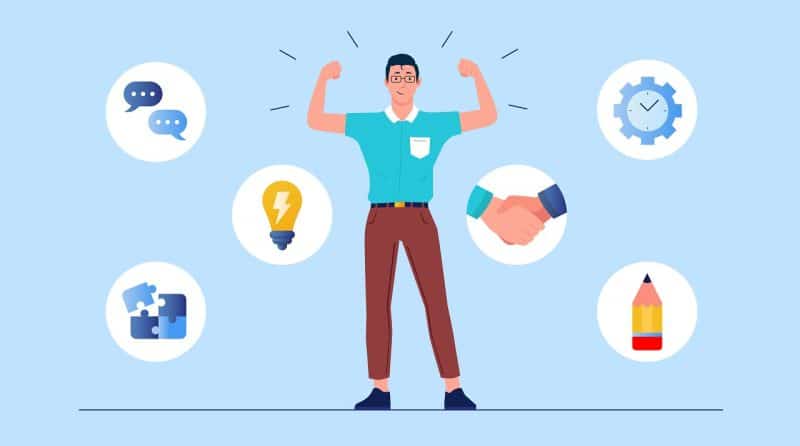Confession time.
Years ago, I landed an interview at a company I really wanted to work for. But I blew it.
The worst part came when they asked me “What are your strengths and weaknesses?” I started rambling and didn’t really answer the question at all.
Luckily, I learned from my mistakes. And so can you — so that you won’t have to make your own ones.
To best answer “What are your strengths:”
- Choose strengths relevant to the job (e.g. quantifiable accomplishments, formal education)
- Talk about unique hard skills that make you a good fit (e.g. platform knowledge)
- Don’t shy away from soft skills (e.g. communication, problem-solving, attention to detail)
- Provide examples of specific situations when you displayed your strengths
In this article, you’ll discover:
- Why interviewers ask “what are your strengths” and “what are your strengths and weaknesses”
- How to answer “what are your strengths” and “what are your strengths and weaknesses”
- Examples of typical strengths and weaknesses you can mention
Want to get an offer after every interview? Our interview prep tool will guide you through all the questions you can expect, let you record and analyze your answers, and provide instant AI feedback. You’ll know exactly what to improve to turn your next interview into a job.

Our users land jobs 8 to 9 weeks faster than the national average. Get ready for your interview now.
Why Interviewers Ask “What Are Your Strengths and Weaknesses”
Interviewers ask “What are your strengths” in order to:
Assess whether you have the necessary skills for the job
It’s an indicator of how much time you’ll spend on onboarding and how quickly you can start contributing to the company.
Evaluate whether you’ll fit in with the team
Your strengths could make you a perfect fit with your team and help the entire team level up.
Identify if there’s space for development and growth
This way, they can set development plans for you and see if your affinities fit in with their plan for this role.
On the other hand, they ask “What are your weaknesses” so that they can:
Assess your level of self-awareness
Recruiters want to check the extent to which you know yourself, and if you’re trying to improve.
Evaluate how you handle challenges and failures
If you can admit your weaknesses and if you’re working on overcoming them, it’ll show recruiters you’re open to continuous learning.
Identify areas in which you might need support and training
They might ask you this question in order to create a plan for your onboarding, training, and career development.
Finally, recruiters may combine these two questions and ask you, “what are your strengths and weaknesses?”
They want to give you more space for putting your strong and weak sides into context. It’ll give them a realistic picture of your experience and skills.
The question will allow you to explain why a certain strength is particularly important and why a specific weakness is not a dealbreaker.
See our dedicated guides on how to tackle other common job interview questions:
- Why should we hire you?
- Why do you want to work here?
- Tell me about yourself
- Where do you see yourself in 5 years?
- What’s your greatest weakness?
“Typical” Strengths Examples to Mention in an Interview
Here are some common (and good) strengths you can mention next time they ask you “What is your biggest strength” or “What are your strengths”?
- Problem-solving
- Communication
- Critical thinking
- Time and task management
- Interpersonal and intrapersonal skills
- Analytical thinking
- Reliability
- Dedication
- Flexibility and adaptability
- Determination
- Working well under pressure
- Open to feedback
- Emotional intelligence
- Patience
Experience-related strengths
Everyone has their own path. Let this play in your favor. You probably have a unique experience (life + work) that helped you hone certain skills.
For example, if you don’t have any work experience yet, but you used to spend entire summers at your grandparents’ countryside farm, you probably learned a thing or two. You helped out with the work, got up early in the morning, and developed strong discipline and time and task management. These are lovely transferable skills you can use in every aspect of life — and you can mention them to gain an advantage over other people during the interview (plus, it would be a great story to break the ice and display your personality).
Here are additional examples:
- The work ethic you developed in your boring first job ages ago
- The empathy you gained when you had to navigate a major layoff
- Organizational skills you developed when you volunteered to help with organizing a team-building event
- Self-startedness you mastered when you built your mom’s hand-made accessories Instagram store from scratch
Skills learned on-the-job
Skills learned in your previous positions are probably your strongest assets. These are often hard skills closely related to the industry you are in and what the company you applied for is hoping to achieve.
These skills can be:
- Knowledge of an app/platform (WordPress, Ahrefs, Salesforce, Adobe, Klaviyo, etc.)
- Knowledge of programming languages (Javascript, CSS, etc.)
- Payment processing
- Workflow development (sequential, state machine, rules-driven, etc.)
- Project management (Agile, Scrum, Lean, Kanban, etc.)
- Writing long-form or short-form content (email sequences, articles, blogs, case studies, SMS marketing, landing pages, etc.)
SEO knowledge - Google ads/LinkedIn ads
Formal education
You can highlight a degree or even experience related to your formal education such as:
- Relevant coursework
- Relevant practical exams
- Debate club
- Volunteering
- Extracurricular activities
- Seminars
- Awards
- Workshops
Soft skills relevant to the position
There’s plenty to choose from, but make sure the soft skills are actually relevant to the position you’re applying for.
You can identify these by asking yourself: what are some traits and skills that complement the key hard skills that make me a good fit for this job? And will they make my life at work easier?
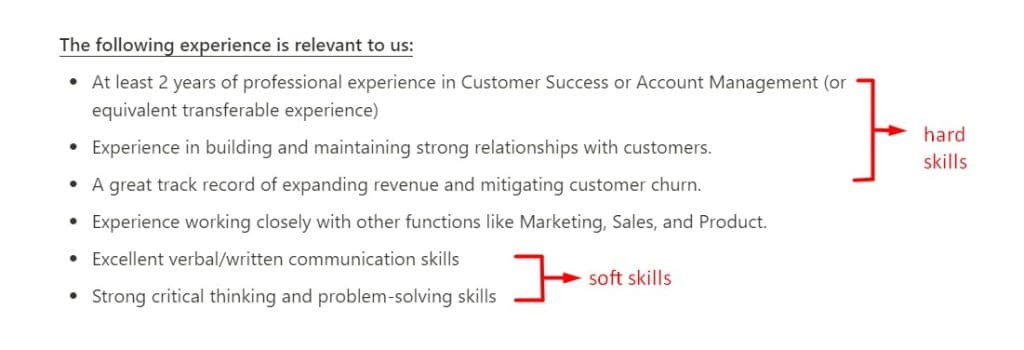
If you’re applying for an HR position, you’ll need to have outstanding interpersonal and intrapersonal skills.
Cashier? You’ll need to be a communicative and quick thinker.
Nurse? Emphatic and quick on your feet.
Most common soft skills are:
- Interpersonal and intrapersonal skills
- Communication skills
- Problem-solving
- Time and task management
- Critical thinking
- Decision-making
- Teamwork
- Stress management
- Attention to detail
- Work ethics
- Goal setting and prioritizing
How to Answer “What Are Your Strengths?”
Here’s how to craft your answer to this question.
1. Choose strengths relevant to the job
Choose and mention only the skills that are relevant to the position.
For this, you’ll need to study the job description, find out more about the company, and potentially speak to someone from the company who works in the same or similar position.
Applying for a project manager position? You’ll need to mention your superb time and task management, people skills, conflict resolution, critical thinking, thinking several steps ahead, and similar.
Content writer? Superb writing and solid SEO skills, friendly and open to feedback, and great attention to detail.
Sales representative? Communication skills, persuasive speaking and writing, friendly, quick thinking, helpful.
Cashier? Friendly, efficient, interpersonal skills, good with money, patient.
Nurse? Experience with ICU/ER (whatever hard skill), people skills, compassion, patience, quick thinking, and nurturing.
You get the drill.
What are your strengths: Sample answer
2. Talk about unique hard skills that make you a good fit
There must be a key hard skill needed for that position you applied for. If you possess it, you need to emphasize it during the interview.
Talk about the background, how and when you acquired the skill, what it helped you achieve, maybe single out the biggest accomplishment, etc.
Pro tip: pair one or two key hard skills with several soft skills that complement them. It’ll put them into context and give recruiters more insight into your experience and personality.
What are your strengths: Sample answer
3. Don’t shy away from soft skills
Some candidates don’t want to mention soft skills because they think everyone has them, or they’re too general.
This couldn’t be further from the truth.
Soft skills say a lot about your personality and as we already said, complement hard skills wonderfully.
For example, you can be a superb medical worker with tons of knowledge and experience. But if you’re not emphatic and if you don’t know how to communicate with sick people’s families and your own coworkers, it can all go to waste. You’ll be remembered as a rude person, difficult to work with.
Don’t underestimate the power of soft skills.
What are your strengths: Sample answer
4. Provide examples
In order to make your strengths impactful and memorable, provide examples for each.
It can be a short story about how you acquired a certain skill, how you behaved in a certain situation, or how you achieved certain goals and results.
Anything that will put the skills into context and show how they make you a valuable asset will do! (If you look at the samples above, you’ll see they contain examples and details to prove their point.)
To get more details about learning how to talk about your strengths, click here.
Examples of Typical Weaknesses to Mention
First of all, avoid listing weaknesses such as perfectionism and the tendency to take on too much work. They’re overused, not honest, and (debatably) not actual weaknesses.
Mention your real weaknesses, and make sure you say what you’re currently doing to improve in those areas (it shows awareness and action).
It might happen that the weakness you mention can actually harm your chances of being successful in that job. If you successfully cover it up (which is not likely), you’ll end up burned out, underperforming, and hating your day-to-day. This is why it’s important to be genuine and transparent when talking about weaknesses, both for your own sake and for the employer.
Some of the typical weaknesses you can mention are:
- Getting overwhelmed easily
- Being prone to insecurity or self-doubt
- Lacking presentation skills
- Lacking numbers/analytical skills
- Lacking knowledge of a particular platform
- Lacking industry-related knowledge (SEO, email deliverability, etc.)
- Being introverted
- Being extroverted
Not entirely happy with how many interviews you’re scoring? Maybe it’s time to revamp your resume. These guides will be a good starting point:
- How to Write a Resume
- Resume Formatting Basics
- Resume Summary Examples
- Resume Objective Examples
- Resume Profile: What It Is & How to Write It
- How to Describe Your Work Experience on a Resume
- How to Create an Education Section on a Resume
- The Best Skills for a Resume
- How to Describe Hobbies and Interests on a Resume
How to Answer Questions About Weaknesses
And here’s how to tackle the weaknesses too, in case the recruiters ask you “What are your strengths and weaknesses”.
(FYI, we have a separate guide on answering the stand-alone question “What is your greatest weakness”).
Be honest
As we already mentioned, don’t try to present strengths (or what looks like strengths) disguised as weaknesses.
“Oh, I work too much.”
“I’m so dedicated that I often lose a sense of time and ignore my personal life.”
“I’m a huge perfectionist.”
All bad answers. You’re purposefully trying to look good. (Plus, if a company actually considers these “strengths”, they probably have a toxic work environment and you should run for the hills.)
Mention things you really consider yourself less-than-perfect at. Try not to sabotage your reasonable chances of getting that job (“I hate people and have a tendency to drink at work”), but don’t try to disguise actual strengths as weaknesses, you’ll come across as pretentious.
Talk about improvement plans
For every weakness you list, it’s best to talk about what you’re doing to improve them.
It will show you’re self-aware and actionable, as you’re actively taking steps to improve yourself.
Let’s revisit the typical weaknesses we mentioned a few chapters earlier and see what you can add to each.
- Getting overwhelmed easily (but you’re learning breathing and meditation exercises you apply every time you get overwhelmed at work)
- Being prone to insecurity or self-doubt (but you’re working on accepting your good and bad sides equally; nobody’s perfect)
- Lacking presentation skills (but you’re throwing yourself into the fire and you volunteer to give a presentation every time you can)
- Lacking numbers/analytical skills (but you’re regularly making time to go into Google Analytics and dig around)
- Lacking knowledge of a particular platform (but you took the course on Udemy/asked an expert to help you out)
- Lacking SEO knowledge (but you’re currently devouring Ahref’s blog posts and speaking to an expert from your company)
- Being introverted (but you’re making yourself step up and voice your opinions on meetings)
- Being extroverted (but you’re making a conscious effort to tone it down, let others speak more, ask for others’ options, etc.)
Pro tip: If applicable, explain how a particular strength of yours can outweigh a weakness. You can also try to place it within the framework of your team and show how you complement your coworkers and make up for things you lack.
For example, if you’re not a natural-born public speaker, you won’t run workshops for junior teammates. It’s your weakness. But your strength is writing, so you can participate in the onboarding process by creating documentation and detailed manuals.
For a bunch of additional tips on how to talk about your strengths, sell yourself in an interview, negotiate, and land your dream job, get our free course here!
Practice
Remember my disastrous interview experience from the intro? Well, it was all because of the lack of practice. If I had taken the time to at least draft ideas for answering interview questions on paper, I would have done a lot better.
At the time, I thought preparing for interviews was a waste of time. After all, I know how to talk about myself, right? Well, I was wrong.
It was when I started using Big Interview that I realized just how important preparing in advance is.
I remember that I started by watching the “What are your strengths” video to try and figure out the reasons why I failed to answer it.
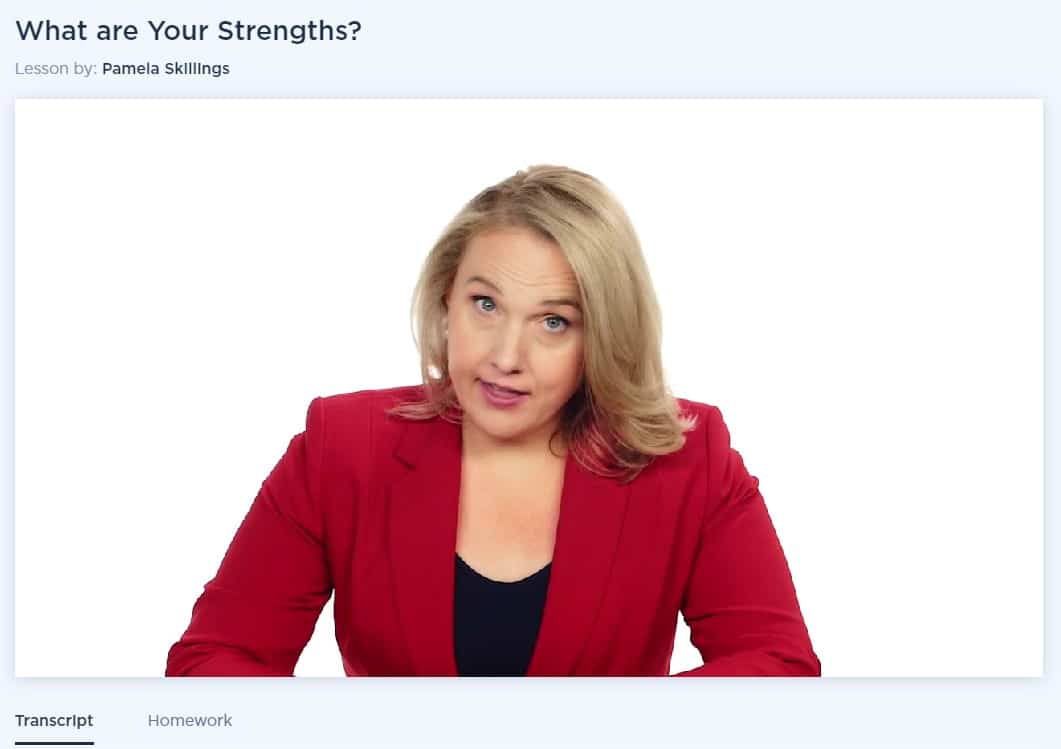
When I was done, I logged in to the Answer Builder and jotted down every point that seemed worth mentioning.
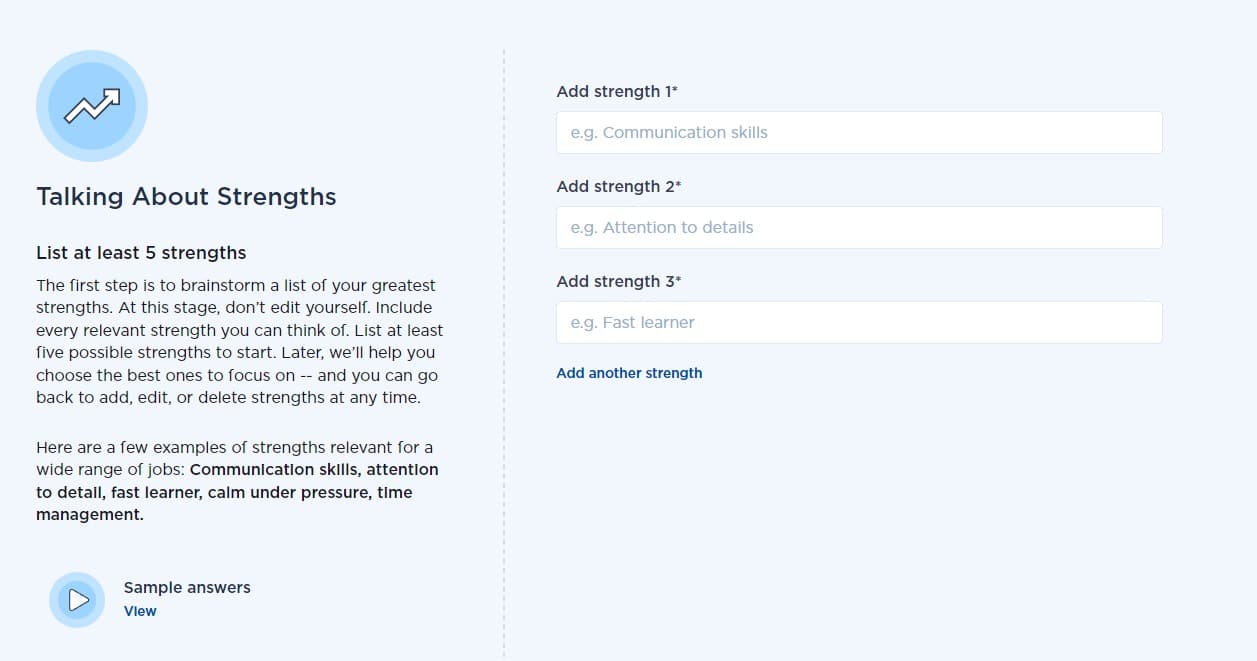
(Btw, I liked that the builder provided tips and tricks (and sample answers) to get me inspired while I was drafting my answers.)
Then I record myself answering questions and did a self-assessment (but there’s also the option to send the recording to a friend to ask for their opinion). The Mock Practice tool provides awesome feedback too, so I didn’t have to bother people around me.
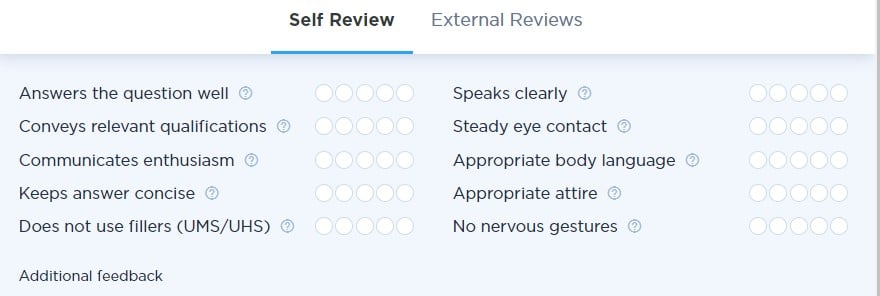
You can also do this with pen and paper or by typing out your bullet points in Notes or Google Docs. And then you can practice in front of a friend.
Whatever you choose, it’s good, as long as you’re preparing beforehand.
Additional Sample Answers to “What Are Your Strengths?”
Below are a few videos for common job positions. Each of them answers the question “What Are Your Strengths?” We hope they’ll get you inspired and craft your own answer to the question.
Sample answer for a Technology Team Lead
Sample answer for a Data Analyst
Sample answer for a Head of Marketing
Sample answer for a Medical Doctor
These were examples for answering “What are your strengths” — but if you want to discover additional common questions recruiters ask during interviews (and how to answer them), check out Common Interview Questions and How to Answer Them.
Summary of the Main Points
- “What are your strengths” is a question you’re likely to hear in every job interview. But recruiters also want to know about the combination of your strengths and weaknesses, so they may ask “What are your strengths and weaknesses”
- Recruiters want to know if you know yourself, if you’re a culture fit, if there are things you can improve, and how you handle challenges
- Mention strengths you gained through experience, on your current job, during formal education, or soft skills which are a part of your personality
- Be honest when speaking about your strengths and weaknesses
- Choose skills that are relevant to the position you’re applying for
- Provide examples and stories for each strength
- For each weakness, say what you’re doing to improve it
Good luck!
____________________
Need a hand? There are 3 ways we can help you:
- Don’t know how to talk about yourself? Learn how to succinctly answer the “Tell me about yourself” question.
- Tired of interviewing and not landing the job? Discover actionable lessons and interview practice here (Rated with 4.9/5 by 1,000,000 users).
- Use our new Resume AI tool to instantly improve your resume and start landing more offers.
FAQ
What are some typical examples of strengths employers want to hear about?
Here are some common strengths employers like to hear:
- Strong communication skills: demonstrating your ability to effectively listen, communicate ideas, and work well with others.
- Problem-solving: highlight your ability to analyze different situations and come up with workable solutions.
- Adaptability: emphasize your capacity to adapt and adjust to changing landscapes and priorities.
- Leadership: showcase your ability to motivate, guide, and support others to fulfill their potential.
- Teamwork: exhibit your ability to work collaboratively to achieve shared goals.
- Time management: indicate your aptitude for organizing responsibilities, meeting deadlines, and prioritizing tasks.
What 3 strengths are the most important in the workplace?
The top three strengths that are crucial in the workplace include:
- Communication skills: As they foster collaboration, idea-sharing, and efficient work processes.
- Problem-solving: Because it helps tackle challenges and find innovative solutions.
- Adaptability: As it enables you to adjust to new situations and contribute effectively.
Should I focus on my traits, skills, or achievements?
Focus on your skills and achievements, as they provide tangible evidence of your capabilities. Highlight transferable skills that are relevant to the position, and back them up with specific accomplishments to showcase their real-world impact.
What if I don’t have any unique strengths, just do my job well, in general?
Even if your strengths seem generic, they can still be beneficial. Focus on how you’ve consistently demonstrated your strengths in job-related scenarios, and provide examples of your reliability and commitment to producing high-quality work.
When asked about strengths, should I also talk about weaknesses?
Don’t discuss weaknesses when asked about strengths. It may divert attention from your positive attributes. Listen to the question carefully, and focus on highlighting your strengths with specific examples. You can address weaknesses later if explicitly asked by the interviewer.
What strengths should fresh graduates or people with no experience mention?
Fresh graduates or those with no experience should mention strengths such as:
- Quick learning ability: demonstrate your ability to learn and integrate new information quickly from coursework, projects, or internships.
- Initiative: show examples of taking initiative in group projects or extracurricular activities to emphasize your self-starting capabilities.
- Teamwork: showcase your experience working in groups or teams in coursework or volunteer work to demonstrate collaborative skills.
How should you talk about strengths without sounding too arrogant?
To discuss strengths without sounding arrogant:
- Be genuine: speak honestly about your strengths and provide concrete examples instead of exaggerating or sounding self-aggrandizing.
- Stay relevant: focus on strengths that specifically relate to the role you’re applying for, showing that you know which skills are critical for success.
- Balance confidence and humility: express confidence in your capabilities, but also convey openness to learning and improving in your new position.
